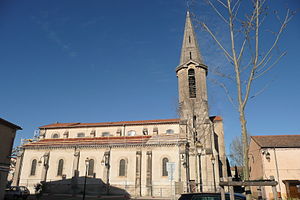Rognonas
| Rognonas | ||
|---|---|---|

|
|
|
| region | Provence-Alpes-Cote d'Azur | |
| Department | Bouches-du-Rhône | |
| Arrondissement | Arles | |
| Canton | Châteaurenard | |
| Community association | Terre de Provence | |
| Coordinates | 43 ° 54 ' N , 4 ° 48' E | |
| height | 16-25 m | |
| surface | 9.41 km 2 | |
| Residents | 4,101 (January 1, 2017) | |
| Population density | 436 inhabitants / km 2 | |
| Post Code | 13870 | |
| INSEE code | 13083 | |
| Website | rognonas.fr | |
 Church in Rognonas |
||
Rognonas is a French municipality with 4101 inhabitants (at January 1, 2017) in the department of Bouches-du-Rhône in the region of Provence-Alpes-Cote d'Azur .
geography
Rognonas is five kilometers south of Avignon . It belongs to the Terre de Provence municipal association .
The neighboring municipalities of Rognonas are Avignon in the north, Châteaurenard in the east, Graveson in the south and Barbentane in the west.
history
The village was first mentioned in a document in 980. In the eleventh century the place was a small harbor village and also had a ferry across the Durance . In the twelfth century the place received its first chapel. Towards the end of the 14th century, the village was ravaged by hunger, wars and natural disasters. In 1468 the borders of the municipality were fixed, the place had 940 inhabitants at that time. However, three years later, only two families remained. In 1683 there were a dozen country houses and four peasant huts here. In 1750 the church was rebuilt. In 1833 the suspension bridge to Avignon was inaugurated, and the first public school was built. In 1839 there was a major drought in the flourishing trading town, and the state agreed to aid. The first Mairie was built in 1841 . In 1843, when 1200 people lived in the village, the church tower was inaugurated, and in 1852 it was given a clock. In 1848 the railway line to Tarascon was opened. In 1857 there was the first post office in Rognonas. A new cemetery was also established in 1860 because the old one was too small. On May 25, 1885, a market began to be held, initially three times a week, and from 1890 onwards there was a daily market. In 1904, seven people were killed in an explosion in the Café de France . In 1925, electrification began in Rognonas. In 1929 the place was plagued again by extreme weather, in winter the Durance froze. In 1935 there were again floods. In 1944 the bridge was destroyed by bombing on August 15th. In 1951 a new bridge was inaugurated.
Population development
| year | 1962 | 1968 | 1975 | 1982 | 1990 | 1999 | 2007 | 2017 |
| Residents | 1927 | 2247 | 2680 | 3156 | 3358 | 3578 | 4025 | 4101 |
| Sources: Cassini and INSEE | ||||||||
Culture
Attractions:
- Church of St. Peter from the 19th century
Celebrations:
- Fête du cheval et foire à la brocante on May 7th and 8th
- Christmas market and book festival on November 11th and 12th
